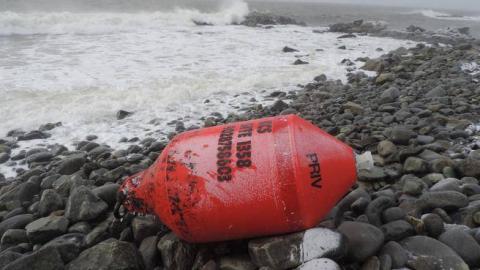You are here
Open-pen fish farming a mess: How the world is passing us by

Chronicle Herald February 24, 2018
by RALPH SURETTE
There’s big stuff happening in the dirty world of open-pen salmon farming. World production of farmed salmon is declining and prices are rising accordingly. The main culprit is sea lice grown immune to the chemicals used to wash them off, helped by algae blooms, fish disease, pollution, damaged wild stocks, and finally political disgust with the whole mess in the more enlightened jurisdictions.
The move now, worldwide, is to either haul production to dry land or otherwise insulate the at-sea operations from the surrounding environment, cutting out disease, lice and pollution.
Nova Scotia, alas, is not an enlightened jurisdiction. On Jan. 4, a powerful storm — the one that ripped up the road at Queensland Beach near Hubbards — mashed up the Cooke Aquaculture salmon operation in Jordan Bay, a shallow, poorly flushed bay that scientists said shouldn’t have salmon cages to begin with. There were busted cages, styrofoam and other fish pen debris all over the shore. Not only that, it’s the third time in four years the site has been devastated — fish frozen by superchill in 2015, wiped out by disease in 2017, and now this.
Although the incident was convincingly documented by the group that watches Jordan Bay like a hawk, Cooke says nothing significant happened — at least nothing that’s the public’s business. No escapes, no dead fish, thus no controversy. The provincial government helps in the coverup — if Cooke says there’s no problem, there’s no need to investigate.
Compare this with what happened in Washington State. Our Cooke — a New Brunswick company, now the fifth largest salmon farming company in the world — had a breakdown in its cages last summer in Puget Sound. Some 250,000 fish escaped, and were found to be diseased.
State officials found Cooke negligent, cancelled its lease and fined it $332,000. “The company’s reckless disregard endangered the health of our waters and our people, and it will not be tolerated,” said the state’s public lands commissioner.
But the state went farther. It declared that all open-pen leases would be cancelled when they came up for renewal. It’s the last U.S. Pacific state to do so. Meanwhile, the B.C. government has said it will do the same. The entire North American Pacific coast intends to be rid of open-ocean fish pens.
What about elsewhere? The industry howls blue murder that land-based fish farming is not economically viable. The Nova Scotia government in 2014 got Gardner Pinfold consultants to crunch some numbers and they came up with a “not commercially viable” verdict. It would cost $1.5 billion to move Nova Scotia’s sea-pen operations to land, it said.
Yet here’s what’s happening. Recently, three huge dry-land salmon operations costing in the hundreds of millions have been announced for Maine, Virginia and Florida, indicating that some of the big operators are getting the message. Half of Denmark’s production is on land. The online fishery publication Fish Farm News and Science says there are 20,000 actual land fish farms in the world (of various kinds of finfish, not all salmon) and has counted 212 different systems by which they operate.
Indeed, right here in Nova Scotia, there’s a dozen or so either operating or planned, although not all do salmon. Notably, Sustainable Blue at Centre Burlington, down the Avon estuary from Windsor, got a $1-million ACOA loan last spring for a substantial operation.
One of the mysteries to watchers of Jordan Bay is why Cooke doesn’t pull out if its fish are regularly destroyed. The answer seems to be that, as long as you have the ocean as a free sewer, have no property taxes and are larded with government grants (Cooke set up in Nova Scotia with a $25-million loan-and-grant in 2012, and for a while was being paid handsomely by the federal government for every dead fish it disposed of ), it’s profitable even if you’re only harvesting a fraction of the fish.
When it started in the 1980s, salmon farming seemed like such a lovely little industry — something hard-pressed commercial fishermen could do for extra cash, and maybe even take the pressure off the ocean stocks. Very quickly, they were gathered up into huge multinational companies that became the darling of governments everywhere, and that were soon enough dictating their regulatory regimens and recruiting them in the denial of the mounting problems.
Norway, the largest producer in the world, is more or less where it started and where the problems are also in the vanguard. The sea lice, overcoming the chemicals, have proliferated in the billions. A few years ago, there was a watershed moment. Faced with the reduction of wild salmon stocks to half — mainly because of the lice they picked up near the cages on the way to the sea — Norway was forced to warn pregnant women not to eat the fish because of chemical contamination, while some of the country’s own supermarket chains refused to sell Norwegian farmed fish. The government put a moratorium on cage expansion (some producers are suing) and started encouraging land-based operations (and sea-based immune ones — one company is converting a freighter into a fish farm).
Meanwhile, in case you’ve missed the logical conclusion here, it’s this: that the Nova Scotia government join the world and tell Cooke the jig is up in Jordan Bay, and that it will be discouraging these open-pen floating pig farms from now on.
http://thechronicleherald.ca/opinion/1548147-surette-open-pen-fish-farmi...
Copyright APES 2012 Website by Ionsign Online

